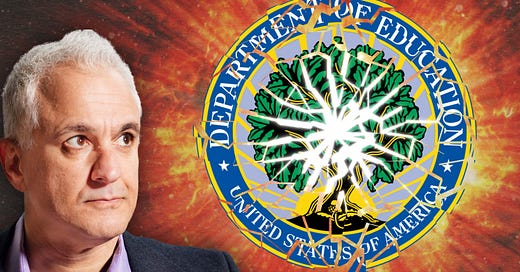Western civilization thrives on one extraordinary strength: our ability to correct errors. Rooted in the Enlightenment, this tradition of criticism has propelled our society forward by enabling us to identify flaws, test solutions, and question orthodoxies. But this engine of improvement is under attack—not just from pernicious cultural fads like wokeism but from the very institutions meant to guarantee methods of free inquiry. Chief among these is the Department of Education, an un-American bureaucracy that institutionalizes conformity, stifles dissent, and destroys the mechanisms of error correction.
Our academies have been ideologically captured. Accrediting agencies, sanctioned and overseen by the Department of Education, hold the keys to legitimizing schools and universities. These agencies wield their power by tying accreditation—the lifeblood of federal funding—to adherence to ideological dogmas. Consider the case of the American Bar Association, which has pushed Diversity, Equity, and Inclusion (DEI) mandates onto law schools. Institutions unwilling to comply risk losing accreditation, effectively shutting their doors. Instead of fostering intellectual diversity, these agencies enforce ideological conformity, penalize dissenters, and reduce education to a crude political tool.
This system does not promote inquiry; it enforces orthodoxy. Liberty, free markets, and free speech—once the foundation of the U.S. educational system—have been systematically dismantled. The Department of Education, through centralized control and weaponization of accreditation agencies, undermines local autonomy and enforces ideological compliance. This is not education—it is control.
This system is not merely enforcing conspicuous ideological policies. It is un-American. America’s founding principles celebrate local control, cognitive liberty, and most importantly, the free exchange of ideas—including the ability to criticize. Yet the Department of Education concentrates power in Washington (sidelining parents, communities, and educators) and accreditation agencies enforce top-down mandates that punish opposing views and enshrine epistemological and moral orthodoxies.
“Inclusion” is one such example. Despite the claim, inclusion does not mean including a diverse array of individuals, like African Americans, the trans self-identified, and those in wheelchairs. Rather, inclusion means creating a welcoming environment. But a welcoming environment cannot be created if some people feel offended. So, to prevent people from feeling offended, speech needs to be restricted so that everyone can feel welcome. Inclusion, then, means restricting speech.
When educational institutions subvert open inquiry, they produce enfeebled generations of citizens incapable of rationally refuting arguments. Universities that once welcomed debate now silence opposition. Consider Bret Weinstein, a professor at Evergreen State College, who faced harassment and threats for refusing to participate in a racially segregated “Day of Absence.” Rather than uphold free speech, the administration sided with the mob, allowing activism to spiral into chaos. Or take Princeton University, where Professor Joshua Katz was fired after criticizing a campus initiative to create a faculty committee explicitly aimed at elevating nonwhite scholars. His speech which was deemed “hurtful,” became the basis for retaliation under the guise of institutional policy.
The Department of Education did nothing to address these abuses because these institutions are not merely compliant with the ideological zeitgeist—they are agents of it.
Another example of bureaucratic overreach is the Department’s Office for Civil Rights (OCR), which has pressured schools to adopt Title IX policies that trample on due process. These policies, under threat of losing federal funding, have created kangaroo courts in which students accused of sexual assault or harassment are denied basic due process such as the right to cross-examine one’s accuser and the right against double jeopardy. The result? Countless careers and reputations have been destroyed in a system that prizes ideological expediency over fairness and rationality.
The solution is clear: Abolish the Department of Education. The means of error correction would then be freed from bureaucratic strangleholds and centralized dogmas. Critics will, of course, ignore arguments about error correction and free speech. Instead, they’ll argue that abolishing the Department risks a decline in educational quality. But the current system is already failing. Student test scores have been plummeting since the Department was established in 1979, and illiteracy and innumeracy have been steadily rising.
The philosopher Karl Popper famously defined democracy as the ability to remove rulers without violence. The same principle applies to ideas: progress requires the freedom to challenge and criticize. The Department of Education, by institutionalizing unquestionable moral norms, destroys that ability. It is anti-democratic. Worse, it is anti-rational.
If we lose our tradition of criticism, we lose our engine of progress. America’s strength does not lie in its idealism but in its capacity to adapt and improve. Yet this capacity is under threat from a federal bureaucracy that enshrines ideological orthodoxy and promotes values that silence dissent.
This is why the Department of Education must be eradicated. It represents an un-American concentration of power that undermines liberty, erodes the foundation of progress, and destroys our ability to correct errors. The stakes are clear. Do we embrace the tradition of criticism that defines us—or allow an un-American institution to drag us into an ideological sinkhole?
By: Peter Boghossian and Brett Hall




In my next life, intelligent, thoughtful, interesting people such as Peter, Bari Weiss and Rand Paul will be my neighbors...
If anybody in Europe made such a proposal, I would call them "crazy," but in America such a department has given birth to a bureaucracy of idiots whose goal is to outperform each other in proving how "inclusive" and morally righteous they are. But I wonder if abolishing it, the ideology behind it will die. I am afraid not.